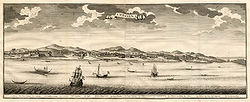Governorate of Ambon
| Governorate of Ambon | ||||||||||
| Gouvernement Amboyna | ||||||||||
| Dutch colony | ||||||||||
|
||||||||||
|
Ambon around 1725
|
||||||||||
| Capital | Fort Victoria | |||||||||
| Languages | Dutch | |||||||||
| Political structure | Colony | |||||||||
| Governor | ||||||||||
| • | 1605-1611 | Frederick de Houtman | ||||||||
| • | 1618-1625 | Herman van Speult | ||||||||
| • | 1701-1706 | Balthasar Coyett | ||||||||
| • | 1724-1729 | Stephanus Versluys | ||||||||
| • | 1794-1796 | Alexander Cornabé | ||||||||
| Historical era | Imperialism | |||||||||
| • | Capture of Fort Victoria | 22 February 1605 | ||||||||
| • | Capture of Ambon Island by Great Britain | 1796 | ||||||||
|
||||||||||
Ambon was a governorate of the Dutch East India Company, consisting of Ambon Island and ten neighbouring islands.Steven van der Hagen captured Fort Victoria on 22 February 1605 from the Portuguese in the name of the Dutch East India Company. Until 1619, Ambon served as the capital of the Dutch possessions in East Asia. In that year Batavia was founded to function as the staple port for the Dutch East India Company in Asia. The island was the world center of clove production until the 19th century. The Dutch prohibited the rearing of the clove-tree in all the other islands subject to their rule, in order to secure the monopoly to Ambon.
In 1513, the Portuguese were the first Europeans to land on Ambon Island, and it became the new centre for Portuguese activities in Maluku following their expulsion from Ternate. The Portuguese, however, were regularly attacked by native Muslims on the island's northern coast, in particular Hitu, which had trading and religious links with major port cities on Java's north coast. They established a factory in 1521, but did not obtain peaceable possession of it until 1580. Indeed, the Portuguese never managed to control the local trade in spices, and failed in attempts to establish their authority over the Banda Islands, the nearby centre of nutmeg production. The creole trade language Portugis however was spoken well into the 19th century and many families still have Portuguese names and claim Portuguese ancestry.
The Portuguese were dispossessed by the Dutch on 22 February 1605, when Steven van der Hagen took over Fort Victoria without a single shot. Ambon was the headquarters of the Dutch East India Company (VOC) from 1610 to 1619 until the founding of Batavia, now Jakarta, by the Dutch. Around 1615, the English founded a settlement on the island at Cambello, which lasted until 1623.
...
Wikipedia



